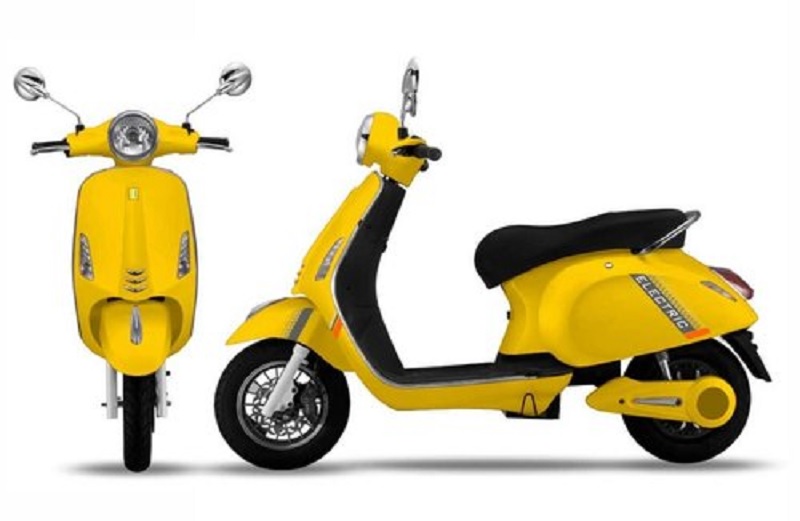The TNR EStyla is making a name for itself in India’s growing electric scooter segment. Positioned as a low-speed, affordable option, it’s designed to cater to daily commuters looking for a practical, eco-friendly alternative to petrol scooters. What sets the TNR EStyla apart is its stylish design, decent range, and price tag that won’t break the bank.
Backed by TNR Electric Vehicles, a brand focused on last-mile mobility, the EStyla delivers just enough to meet the needs of short-range users. Whether it’s grocery runs, college commutes, or daily work trips, this scooter aims to tick the right boxes for cost-conscious EV buyers.
Stylish Looks with a Minimalist Touch
The TNR EStyla has a clean and compact design. It borrows cues from traditional scooters but adds modern touches to give it a fresher look. The front apron gets dual-tone treatment, and the headlamp is neatly positioned on the handlebar for a sharp appearance.
The scooter gets integrated LED DRLs, body-colored rearview mirrors, and stylish grab rails. The overall silhouette is upright and easy to maneuver, making it ideal for tight urban roads. The flat floorboard and simple switchgear layout keep things functional and beginner-friendly.
Performance and Battery Specs
Since the TNR EStyla is a low-speed electric scooter, it does not require a license or registration. It is powered by a 250W BLDC hub motor and is designed for speeds up to 25 km/h. While it’s not built for speed, it is perfect for short city runs and residential area commutes.
Battery and performance details:
| Motor | 250W BLDC Hub Motor |
|---|---|
| Top Speed | 25 km/h |
| Range | 60–80 km per charge |
| Battery Type | 60V/30Ah Lead Acid or Lithium-ion |
| Charging Time | 4–6 hours (Li-ion), 6–8 hours (Lead Acid) |
Depending on the battery pack you choose, you can expect different charging durations and range figures. The lithium-ion version is quicker to charge and slightly lighter, making it a better option for daily users.
Riding Comfort and Handling
The TNR EStyla comes with a telescopic fork at the front and twin shock absorbers at the rear. The suspension setup is tuned more for comfort than handling. It handles small potholes and road joints fairly well, though it’s not meant for aggressive riding or rough roads.
Thanks to its lightweight chassis and narrow body, it’s extremely easy to ride. Even younger riders and elderly users will find it simple to balance and control. The riding posture is upright, and the seat is wide enough for two.
Braking and Safety Features
Safety features are basic but reliable for the category. The scooter comes with drum brakes on both ends and uses electronic braking assistance to enhance stopping power. At low speeds, this setup works well and delivers stable braking even in traffic.
Other safety features include:
- Anti-theft alarm
- Side-stand cut-off switch
- Central locking system
- Integrated parking brake
These small features help make the scooter more secure when parked and safer for everyday riders.
Display and Convenience Features
The TNR EStyla comes with a digital instrument cluster that shows basic information like battery percentage, speed, and trip details. It is bright enough to read during the day and adds a modern touch to the scooter’s design.
Convenience highlights:
- USB charging port for mobile devices
- Under-seat storage with moderate capacity
- Dual footrests for pillion comfort
- Bag hook and flat footboard for carrying items
- Detachable battery (in some variants)
These features make the EStyla a practical option for students, homemakers, and working professionals who need a dependable short-distance ride.
Running Cost and Maintenance
One of the biggest advantages of the TNR EStyla is its extremely low running cost. Since it’s fully electric and doesn’t need petrol or oil changes, the operational cost is almost negligible. Charging the battery costs around ₹7–₹10 for a full charge, depending on electricity rates.
Maintenance is minimal:
- No engine oil or air filters to replace
- Battery requires periodic health checks
- Tyres and brake pads are the main wear items
TNR also offers basic roadside support in select cities, and the battery warranty typically ranges from 1 to 3 years based on the type.
Affordability and Target Buyers
With a price tag that typically ranges from ₹55,000 to ₹70,000 depending on the variant and location, the TNR EStyla falls into the entry-level EV bracket. It is ideal for:
- Students commuting short distances
- Elderly users needing a safe and slow-speed scooter
- Delivery executives in local neighborhoods
- Urban users looking for a second vehicle for errands
It’s also an attractive option for those who want an EV but don’t want to deal with licensing, registration, or insurance.
Variant Breakdown and Color Options
The EStyla is available in multiple variants with different battery configurations. Customers can choose between:
- Lead Acid variant: Lower cost, longer charging time
- Lithium-ion variant: Higher cost, better performance and range
Color options include:
- Glossy Red
- Pearl White
- Midnight Black
- Metallic Grey
- Electric Blue
Each color gets a glossy finish and matching decals to keep the styling cohesive.
FAQs About TNR EStyla
Is the TNR EStyla road legal without a license?
Yes. The scooter is classified as a low-speed EV under Indian regulations. No driving license or registration is required to operate it.
What is the range of the TNR EStyla?
The range depends on the battery type. The lead acid version offers up to 60 km per charge, while the lithium-ion model can go up to 80 km on a full charge.
Can I charge the EStyla at home?
Yes. It comes with a standard 5A home charging unit. You can plug it into any regular socket.
How long does the battery last?
Lead acid batteries typically last 12–18 months, while lithium-ion batteries can last up to 3 years with proper care.
Does it support fast charging?
No fast charging is available. Charging time ranges from 4 to 8 hours depending on the battery type.
Where can I service the EStyla?
TNR has a growing network of dealers and service centers across several Indian cities. Basic maintenance can also be done at local EV workshops.










